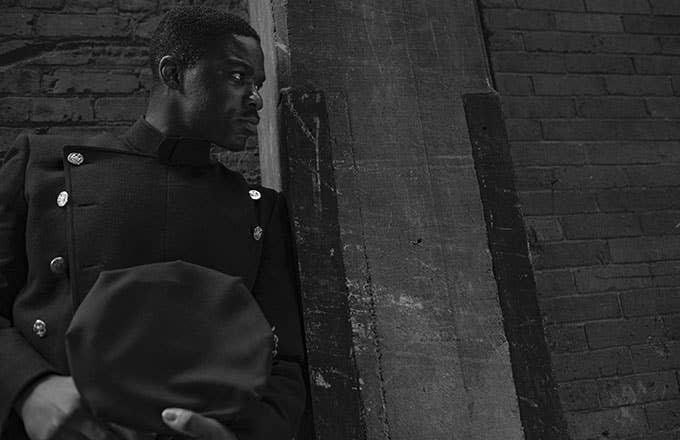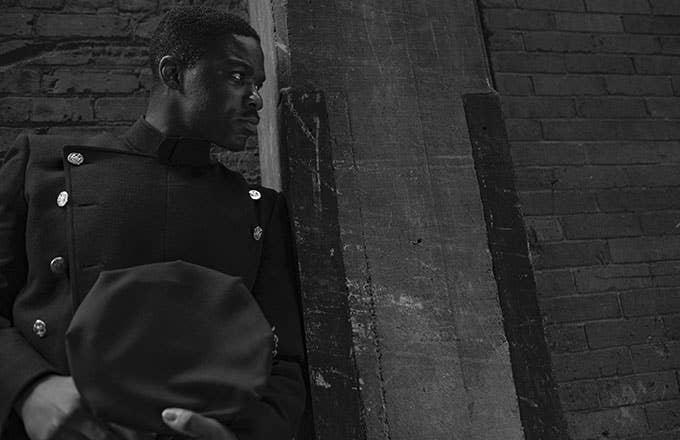
Cord Jefferson is nervous about this week's episode of Watchmen. But excited. But also: “Still pretty nervous because it takes a lot of big swings,” he confesses. But ultimately: “I think we achieved what we wanted to achieve. I’m really proud of the episode. I have fingers crossed that people like it on Sunday.”
Jefferson notched his first TV writing credit in October 2014 after leaving his job at Gawker to pursue his screenwriting goals. Five Octobers later, the stars on his career path have incidentally aligned into a Moment. Just a few weeks ago, he was the common denominator on three series, each vastly different, all very hyped. At the time, Succession was wrapping up an instant classic season from an overall arc Cord helped break, before leaving that writer’s room to return to The Good Place, where he’s a co-producer on the acclaimed comedy’s final season. And then there is Watchmen, Damon Lindelof’s acclaimed sequel—or remix, as he’s taken to contextualizing it—to Alan Moore’s seminal superhero deconstruction comic book which picked up where Succession left off in continuing HBO’s run of appointment television Sundays. Writers rooms typically draft episodes by committee before the writer(s) credited drive the ball home. Which brings us to this week.
The episode in question is “This Extraordinary Being,” the crown jewel of the show’s maiden season (it’s number six of nine), a radical and engrossing hour of television in a series that has only been such since it opened five weeks ago with a visceral depiction of the 1921 Tulsa massacre of Black Wall Street, the first-ever. The series follows Regina King as protagonist Angela Abar, a costumed detective in an alt-history 2019 where superheroes existed decades ago but have since been outlawed and Tulsa cops like Angela wear masks to protect their identities, primarily from a white supremacist domestic terrorist group called the Seventh Kavalry. It’s heady, challenging stuff supplemented by a dense mythology and knotty mystery, much like the comic it draws its source material from (and that’s before factoring in the weekly interludes starring Jeremy Irons as OG Watchmen villain Adrian Veidt, trapped on a moon with a lake full of fetus clones that he can microwave into adult servants as he plots his escape.) And, like Moore’s text, it’s done in service of holding up a cracked mirror to our own society, never more potently than in this latest installment.
“We [got] into some pretty serious racial issues right off the bat,” Jefferson says of the Watchmen writer’s room, which first convened all the way back in September 2017. “[Race] is not something that was a big part of Alan Moore's original text, but in that Alan Moore's original text was a commentary on society, I think that in many ways trying to make a commentary on American society today—as far as I can see there's no way to do that without at least discussing race and racial politics somewhere in there. It is such a huge part of America right now. It always has been a huge part of America.”
The Dumbest superhero is batman
Co-written by Jefferson and Lindelof, “This Extraordinary Being” begins with another scene from Minutemen, a Ryan Murphy-esque biopic show-within-the-show that imagines a graphic retelling of the eponymous Minutemen, the first group of heroes. Founder Hooded Justice, a gravel-voiced badass with an executioner’s mask and noose rope on his neck and wrists removes his mask finally to reveal character actor Cheyenne Jackson under the hood. From there though, the hour becomes an immersive flashback episode that sends Angela mentally hurtling down memory lane where she discovers her grandfather Will Reeves is a Black Wall Street survivor, who then moved to New York and after a lynch attack, donned a hood and ropes to channel his anger and trauma as...Hooded Justice. The very first superhero in Moore’s America—Hooded Justice appears in the comic but never removes his mask—is actually a black man, and Angela is his descendant.
Adult Will is played with seething rage and quiet intensity by Jovan Adepo, who worked with Lindelof previously on The Leftovers. Jefferson was unsure at first, envisioning the character as someone brawnier. "I went along with it because Damon was a big fan of his and said that he could do it. And when I started seeing the dailies, I was blown away. He's incredible. I hope that it does good things for his career because he's super talented. I would like to see him in more [roles]."
So, some 70 years later, how is it Hooded Justice is being fictionalized as Danny from 30 Rock? “Did you hear of the Harriet Tubman thing this week?” Jefferson asks me by phone a few days before “Being” is set to air. “I think that news falls perfectly. It's so timely for that news to break right before this episode comes out.” In perhaps the show’s most sobering, searing commentary on race relations in America yet, Will bluntly acknowledges the citizens of 1930s New York would never accept a black savior by donning white makeup around his eyes should his hood ever slip. Which brings us back to Harriet Tubman and Julia Roberts, a headline pairing stranger than fiction but also unsurprising: Harriet screenwriter Gregory Allen Howard revealed when he tried to pitch this story 25 years ago, a Hollywood exec suggested, with a straight face, America’s lily-white sweetheart Roberts for the role of the black liberator.
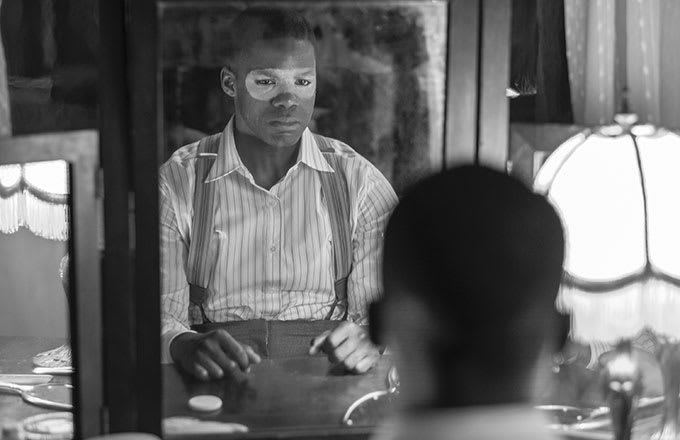
“That's what we're making a commentary on,” Jefferson says. “The fact of how much erasure of darkness and people of color and women and any other [minority] group of people in the United States. It's a commentary on the fact that women and minorities of all types frequently get erased from history in an effort to put whiteness and then particularly white men, to the forefront. This idea that people will refuse to acknowledge that, maybe, there were black people involved in some of their favorite things. It wasn't against any particular show,” he says of what many have perceived as faux-Minutemen’s resemblance to the Ryan Murphy and/or FX biopic-series (and, for that matter, the stylistic kinship it bears to Zack Snyder’s less-acclaimed Watchmen adaptation). “But if anything, against that trend in general, in America.” Because the comic featured one panel with Hooded Justice's mask askew that suggested he had pale skin, the writers almost went with a light-skinned actor. "There was talk at first, that maybe he's light-skinned and could pass as white. But we thought that would be pulling a punch and not actually going through with what we were trying to do," Jefferson says, highlighting just how closely the room studied Moore's text. "So, we decided on the makeup. When we started talking about it more [it] felt really right for the character, he's wearing so many masks. He's queer. He's denying his blackness by putting on this makeup all the time. He's a guy who hides a lot from the people in his life, from his coworkers at the police force, from his coworkers in the Minutemen, from his wife, he's hiding from everybody. So it made sense that he has all of these layers of deception on his face, in order to become Hooded Justice."
Will’s true origins are a bombshell within the series narrative, sure, but it feels seismic outside of that just as an idea. It feels, at least to a black man like myself, like the most compelling and emotionally affecting superhero origin maybe ever—and one that makes so much sense the way it seamlessly fits into our nation’s ugly history. It feels real, and probable. Like the hero story I didn’t know I needed. It’s what made Lindelof, a childhood fan of Moore’s with an emotional connection to the comic and a reverence to the man who famously said it shouldn’t be adapted, want to take it on in the first place. (At least he implied as much in a pre-debut interview with Alan Sepinwall, where he spoke of a "big idea" that cemented his decision to make the show). It’s also what attracted Cord, who hadn’t read the comic before joining the writer’s room, excited to be a part of Lindelof’s vision.
“Damon already had the idea that he wanted Hooded Justice to be black. It sort of made sense to me, that if we're going to say that he's black, it's the 1930s—particularly that he's going around wearing a noose around his neck—it made sense to me immediately, that this would be an act of racial violence that spurred his decision to become a costumed avenger, the first superhero,” Cord explains. “Once I started thinking about this episode, the more that I understood what a good idea it was and in some ways, obvious idea, that of course, the first superhero is a person of color. The more that I've been thinking about this character in this episode and where superheroes fit in the context of America right now, if you look at the world the way that it is right now and the way that it has always been, the dumbest superhero is Batman.”
“The idea that a white, male, billionaire needs to look for justice outside of the law, is crazy, right?” He continues, impassioned. “The idea that Bruce Wayne would ever need to take to the streets in order to get justice is silly. Because Bruce Wayne could buy the courts if he wanted to. He could buy judges, because billionaires in America get to pretty much do whatever they want to do. So, it made sense to me that the first superhero was going to be somebody who couldn't find justice via the traditional means, who couldn't find justice in the courts, who couldn't find justice in the police, needs to put on a hood and a cape and take to the streets, because that's the only way that he'd be able to get justice.” (To that end, the character features an intentional inversion of Superman's origin—survivor of a home up in flames, dating a reporter—a point hinted at by his last name, Reeves, and hammered home in the scene where he reads Action Comics No. 1).
Engaging with such beloved lore in this new context was a risk, but one that’s already been paying off, at least in the ways that matter most. “Something that has made me very excited about the response has been how many black people seem to be enjoying it and watching it. If you read the original Watchmen text, there's only two black characters. Neither of them really are characters of any real substance. If you look at comic books in general, a lot of them are very white, very male. You don't see a lot of color in a lot of Marvel movies. So offering up and broadening the kind of person who might be interested in Watchmen has been really, really gratifying and validating to see.”
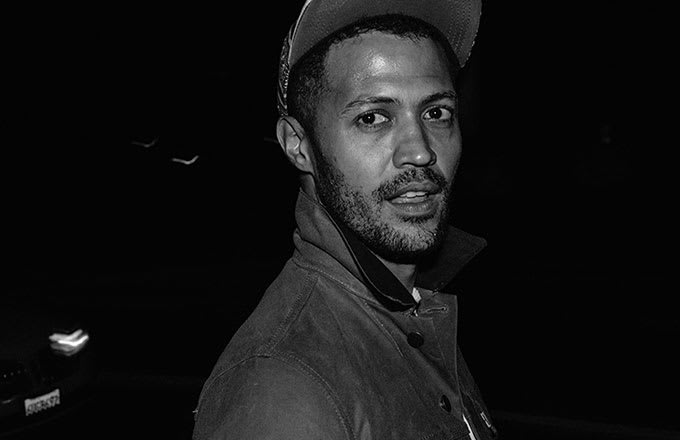
Spotlighting voices, faces, and character types we’re not used to seeing on big platforms has been a thread in Cord’s work. He wrote Master of None’s acclaimed “New York, I Love You” episode, which found Aziz Ansari ceding the focus to short slice of life stories following a Latino doorman, a deaf black woman, and a Burundian immigrant cab driver. And though he didn’t create the character—having joined the show in Season 2—Chidi, the nebbish, hyper-anxious Sengelase professor who provides the show with its moral philosophies, is his favorite character to write on Good Place.
“I see a lot of myself in Chidi. I suffer from anxiety and very frequently even just using the word "anxiety" is a mini-revolution sometimes, because when it comes to speaking about men and masculinity, specifically black men and masculinity, we're allowed to say that you feel stress or you feel pressure from your job but we don't really feel comfortable saying that you're suffering from anxiety or depression. Showing a black man who is suffering from those things is, I think, helpful. For so long what audiences expected from black male characters was stoicism or rage or violence, all these things that we've come to understand as being the stereotypes of what Hollywood thinks about black males.”
Even a show like Succession and its mostly white cast still feels urgent for its commentary on America today. "[It's] touching on a lot of themes that people are thinking about right now," Jefferson says when asked why Succession is resonating so strongly. "Particularly the death of journalism, the growing wage gap, the growing gap between the 1% and the rest of society, how people are manipulating media and how you have very, very bad people in very, very high positions of power in this country. Right now, Succession feels like a very timely story to be telling."
This position among some of Hollywood’s most diverse and exciting writer’s rooms is one Cord almost gave up on. He left Gawker after his writing got to the prolific character actor/producer Mike O’Malley, who drafted him to the writer’s room for the Lebron-produced Survivor’s Remorse. “Nobody cold calls you to come write for a TV writers' room,” his manager Jermaine urged. “That never happens. [Jermaine said] ‘I suggest you take the job and we'll figure out what your second job will be after that. The second job is always easier to get than the first job.’”
Cord went almost eight months without a second job. All while turning down three different full-time journalism gigs in an effort to commit to TV. “It was demoralizing,” he confesses. “I had started to eat into my savings. I was freaking out. I actually wrote to my manager and I was like, ‘Listen, man. If this was a pipe dream, you need to let me know. I'm happy that I did it, it was a great experience, but I can't go on not working.” Jermaine the manager wrote back pleading for Jefferson to ride it out another month or two. “Two weeks after we had that discussion,” Jefferson says, “I got an interview with Larry Wilmore, who was about to launch The Nightly Show.” That gig led to Master of None, which led to The Good Place, then Watchmen, then Succession and ultimately back to Good Place where he's helping steer the show to its series finale.
“I've made it a goal of mine to try to write for people of color and women and underrepresented people in television shows,” Jefferson says of his career path. “I've been lucky enough to work with guys like Aziz and Alan [Yang] and Mike Schur and Damon Lindelof, people who really strive to not only make their writers' rooms really diverse, but also make their shows really diverse and represent the voices of women and people of color in lead roles.” Diversity in front of and behind the camera has been a growing movement in Hollywood for the last few years in both film and TV. “I think that's changing slowly and more showrunners are seeing diversity of voice as a valuable asset. But I think that it still happens too rarely. It's still pretty infrequent.”
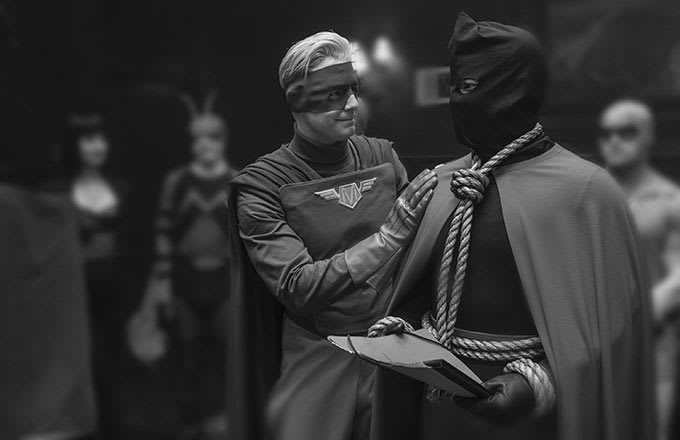
A heavy hour like "This Extraordinary Being" versus the veritable joke machine that is Good Place—which Jefferson describes as "laughing from the moment you get into the office until the moment you leave" to the point where it "doesn't feel like a real job—speaks to Jefferson's dexterity, which one would assume is a common expectation of writers today in Peak TV. Not quite. “I slowly learned that a lot of people actually choose comedy or drama, and it was a binary thing for them. I never wanted my career to be binary in that way, because I love both and very frequently the dramas that I love are very funny. And vice versa, the comedies that I love have moments of drama in them.”
It’s a genre fluidity we’re seeing the industry grapple with and awkwardly try to reconcile in real-time, especially when it comes to awards consideration. “Because Succession is an hour long, it is necessarily a drama and because Barry is a half-hour, it is necessarily comedy. At the end of the day, what's a comedy, what’s a drama, who knows? Hopefully, we can eventually get out of those arbitrary designations, because I don't know what purpose they serve.” To wit, Jefferson says Jesse Armstrong runs Succession unlike most dramas, encouraging writers to visit the set of their episode and pitch new lines and jokes as they come.
Jefferson's already in the midst of his next gig on Station Eleven, a dystopian future adaptation from Maniac creator Patrick Somerville and Hiro Murai, due on HBO Max in 2021. But as for Watchmen, he's excited to watch the season conclude alongside the rest of us. The Good Place schedule forced him to depart from Watchmen early—he's just as in the dark on the specifics of the last three episodes as the rest of us. "What episode six does is opens Angela's eyes as to why her grandfather is back in her life and it softens her, a bit, to him," he says of where the series goes from here in a broad sense. "Up until episode six, she viewed Will as a thorn in her side. Now she understands that he is there for a purpose, but also, she is able to see him for the man he is. And that is a man who has been through some severe trauma throughout the course of his life. Hopefully, she sees that she should be a little softer toward him and what he's trying to do."
As for how this season will wrap up, with many intrigued but wary viewers already throwing that dreaded phrase "stick the landing" around, Jefferson is diplomatic. "This being a Damon Lindelof show, there's going to be a lot of mystery and twists and turns. I have never seen Lost but I do know that The Leftovers is one of my favorite shows, ever. It left a lot of questions unanswered. One being the central question of, what happened to all those people. But that made the show richer and more interesting to me. So, I think that this show will probably do the same."

